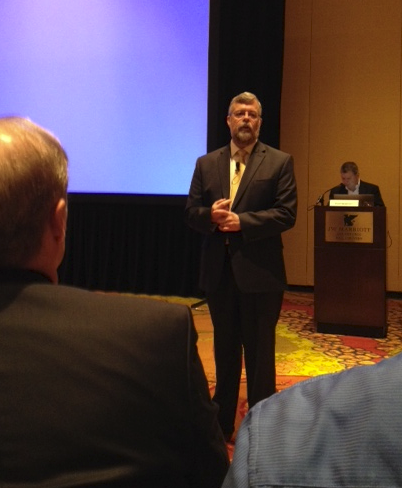Market Data

December 9, 2014
ITR Economist Forecast Sluggish 1st Half 2015
Written by John Packard
For the past four days Steel Market Update (SMU) has been attending and speaking at the HARDI annual conference in San Antonio, Texas. One of the highlights of the conference were the presentations provided by Alan Beaulieu, one of the principal partners of the Institute for Trend Research (ITR) and the chief economist for HARDI. Mr. Beaulieu’s insights and forecasts have proven to be quite valuable to HARDI wholesalers as they prepare for the future.
The good news is, “The U.S. economy is holding the world together.” He told the wholesalers that in the 3rd Quarter 2014, the wholesalers showed the best growth since 2005 which was a boom year for the HVAC industry.

“You should have big hairy bodacious goals in front of you,” he told the jovial assemblage.
However, when he got into the details about the rate of growth and the timing of it all we learned that there is a softening in the economy right now that would last through the first half 2015. He told the wholesalers that their business would have another record high in 2015 but, “it will not be a straight line forecast.” He also pointed to the softening PMI (Purchasing Managers Index) and other leading economic indicators which portray a softer economy at the beginning of the New Year.
He warned the group to reduce expenditures for the 1st Half 2015 and to control their inventories. “Consumers,” he said, “are going to slow down but just for a little [portion] of the year.”
Europe is also having a dulling affect on the U.S. as they deal with a mild recession and we deal with the higher value of the dollar. Mr. Beaulieu told those who attended an industrial/commercial workshop that the Euro would weaken against the dollar for the next six months. The financial community needs to realize that Europe is “…not falling apart, it’s just a recession.”
When it came to steel prices he told the group, “I am not finding a lot of upside pressure on galvanized pricing.”
He also pointed to commodity deflation and said it is not a long term trend. Oil, for example, should see prices back to rising by April 2015.
Mr. Beaulieu forecast housing starts would be up 9.2 percent year-over-year in 2015 but warned again that the bulk of the growth would be in the second half of the year.
Commercial (private) construction which he pegged as rising 13.4 percent in 2014 will be up another 9.5 percent next year.
Office construction will rise by 22.3 percent and there will be some opportunities within the government sector as tax collections and budgets are realigned.
He spoke about the recent elections where he was less than enthusiastic about the Republicans ability to fix anything. “The mid-term elections didn’t change anything,” he said.
He warned that the next mild recession will be in 2019 and, perhaps more troubling, ITR is forecasting a global recession to hit around 2030 and that it would be a “Great Recession” (think 1930) and would last 10 years. The Great Recession of 2030 caused by insolvent governments and massive dept would only be resolved as the pace of baby boomers dying increases. Not a pleasant thought for us boomers.
Actually, he said the boomers will be OK through the Great Recession of 2030. Our social security checks will more than likely be reduced. He told us that as Social Security becomes under-funded there are procedures in place which cut the benefits by a like amount. If Social Security is 50 percent underfunded those receiving benefits will only get 50 percent.
He said the group that will be the hardest hit are Generation X (35 to 55 years old now) who won’t have the savings for retirement and Social Security and other benefits may only be a shadow of what they are now.
Those millenials who save and have no debt by the year 2030 will come out of the Great Recession with a lot of wealth. Not so optimistic for those who don’t save and invest.







